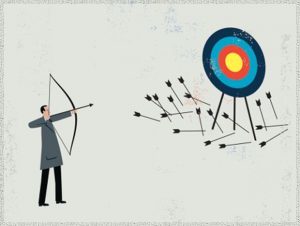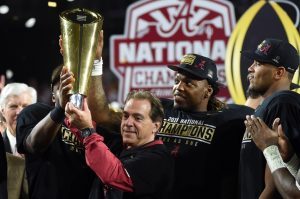Molly Fletcher's Blog, page 14
February 21, 2017
What Being an Athlete Taught Me about Grit
When you score more, kick further, jump higher, doesn’t it feel good? There’s something else going on too when you have those breakthroughs. You’re learning patience and grit. You can take this skill and become a better student, a more thoughtful friend, a well-rounded person, a great leader.
Keep going.
 When I wrote those words a year ago, I had no idea more than 700,000 of you would read my letter to every girl who plays sports. Those two words—keep going—are the essence of grit. Because everyone can benefit by continuing to learn grit, I want to share with you what being an athlete taught me about this important trait and share three of your inspiring “keep going” stories.
When I wrote those words a year ago, I had no idea more than 700,000 of you would read my letter to every girl who plays sports. Those two words—keep going—are the essence of grit. Because everyone can benefit by continuing to learn grit, I want to share with you what being an athlete taught me about this important trait and share three of your inspiring “keep going” stories.
What I Learned About Grit through Sports
My sport was tennis, and my go-to weapon was my serve. Until I lost it, that is.
I would wind up, and my arm got so tight on my backswing that I could barely pull up and over to hit the ball. Instead of a fierce cannon, I had a weak dribble into the net. It’s like a baseball hitter in a slump or a golfer with the yips—horrible, helpless and mortified.
I began telling myself as I served, “Don’t miss it” and “Don’t double fault.” This only made the struggle build on itself. It was so bad I even went to a beginner’s underhanded serve just to get the ball in play.
Here’s how I learned grit: I realized that my messaging was toxic, and I had been practicing the bad habits that would never help bring my serve back. I had to tell myself a new story.
My practice regimen changed 180 degrees, focusing on my serve and a new role playing in my mind. I pretended to be n a pressure situation such as serving 5-all in the third set of an important match, and I practiced executing successfully in those scenarios. When I could finally start producing in practice, I was ready to go back to competitive matches, with a new belief in my abilities.
By keeping going, I overcame toxic thinking and adopted a new mindset. By picking myself back up, I inspired my teammates. They voted me captain my final two years in college. Even though I played the fourth or fifth position (out of six) in singles, and No. 1 in doubles, I was far from the best player on the team.
Grit opened me up to a greater lesson: We can lead from everywhere, not just the top. And that was a super important help for me in business.
How Grit Learned from Sports Helped Me in Business
As competitive as college tennis was, it was nothing compared to being a sports agent. There are far more agents than there are pro athletes and coaches who need this help. Against those odds, you need all the grit you can muster. There are many hard things that must be tackled systematically or you will fail.
Being around top athletes and coaches, I saw how grit meant everything to their success, too. No one gets to that level, much less stays there, through luck. There are many athletes and coaches with deep talent, but none win all the time. Even great athletes get cut and awesome coaches get fired. Teams that look unbeatable on paper don’t always deliver under pressure.
The difference maker is grit. It is demonstrated when failure and setbacks happen by this powerful choice: They keep going. From tennis, I had begun exercising that same mental muscle, and by choosing to keep going after defeats in business, I developed grit in my professional life.
Without grit, I doubt I would have succeeded in sports representation and I surely would not have left that world to establish my own business as a keynote speaker and author to connect, inspire and lead with creative courage and optimism.
Your Inspiring Stories
From the hundreds of comments about my letter to every girl who plays sports, here are three great stories that illuminate how sports can be so powerful for teaching grit to our children, especially our daughters.
1. “My husband and I spent about 14 years on the sidelines watching our daughter Molly play soccer. Even though she’s hung up her cleats, it’s great to see her leverage the skills and lessons skills she learned on the field. She landed a job at her dream company right out of college by not giving up—once a defender, always a defender—and because as you say, she kept going.” – Maggie from Portland
2. “I really enjoyed your inspiring message, as I can relate having played college basketball and multiple sports from an early age through high school. I am grateful to be able to pass on those experiences and the character lessons to my three children as well as those young students I taught and athletes my husband and I coached. The coaches, teachers, and volunteers that made such a difference in my life inspired me to pay it forward. I went into teaching, volunteer coaching and eventually administration to ensure that these life lessons permeate not only the field or the court, but also the classroom and school culture. We must strive to motivate our students, so they may find a passion to pursue, grounded with strong core values, and the perseverance to succeed despite wins and losses. [We] role model for girls (and boys) that these goals may be theirs… if they just keep going!” –Martha from Miami
3. “I am a mom of three girls who all played sports, one at the collegiate level. They are only in their 20s and are in management positions in male dominant industries (aviation, oil and gas, and finance) because ‘the courage, strength and character gained through sports participation are the very tools girls need to become the confident leaders of tomorrow.’ Love it.” – Sherri from Dallas
Your Game Changer Takeaway
What we and our children learn through sports competition can help us push through the unexpected roadblocks to our goals in life. Keep going. Never stop. Remember there will be times when you must keep your goals in front of you even though there are so many obstacles in your way. You are not alone! Let’s keep going with this conversation about grit. I want to hear your story and advice to others.
M olly Fletcher helps inspire and equip game changers to dream, live and grow fearlessly. A keynote speaker and author , Molly draws on her decades of experiences working with elite athletes and coaches as a sports agent, and applies them to the business world. Her new book, Fearless At Work , is now available for pre-order. Sign up here to receive our monthly newsletter.
The post What Being an Athlete Taught Me about Grit appeared first on Molly Fletcher.
February 13, 2017
Dear Failure: Thanks for these 9 Lessons
 Dear Failure,
Dear Failure,
You probably didn’t expect to hear from me so soon after everything that went down. I was devastated for sure. But now I’m moving forward with encouragement from well-known people who have overcome failure as well, and I really need to thank you for all you have done for me.
1. Thanks for pushing me out of my comfort zone. “It is impossible to live without failing at something, unless you live so cautiously that you might as well not have lived at all, in which case you have failed by default.” That’s from author J. K. Rowling, and reminds me of my commitment to fearless living.
2. Thanks for reminding me of my courage and enthusiasm. You helped point me to the sage words of Winston Churchill: “Success is not final, failure is not fatal: it is the courage to continue that counts,” and, “Success consists of going from failure to failure without loss of enthusiasm.” As I move forward, my courage and enthusiasm is getting a good workout.
3. Thanks for resetting my mindset. You made me reconsider my expectations of myself and others, and reminded me of the importance of a safety net. I’m in charge of my expectations; no one else is. As Oprah Winfrey put it: “Think like a queen. A queen is not afraid to fail. Failure is another steppingstone to greatness.” I’ve got this!
4. Thanks for pointing me in a better direction. If not for you, I might be settling for less than what I can do. Like Henry Ford said: “Failure is simply the opportunity to begin again, this time more intelligently.”
5. Thanks for sparking my problem-solving skills. “There is no innovation and creativity without failure. Period,” says Brené Brown. Those mental muscles are engaged in a way that they wouldn’t be otherwise, and I have you to thank.
6. Thanks for inspiring the people who are watching. On my team, failure opens the door to honesty, vulnerability and greater understanding of one another. Amelia Earhart believed that we “should try to do the impossible. And when they fail, their failure should be a challenge to others.” As a parent, my way forward is teaching my kids and helping shape generations to come.
7. Thanks for checking off another way that won’t work for me. Believe me, I do not mind at all being in the same boat with Thomas Edison. “I have not failed,” he said. “I’ve just found 10,000 ways that won’t work.” Bingo.
8. Thanks for building my empathy and determination. I have taken a hard look at the lens through which I see the world, and these words from Michael Jordan sum it up: “I can accept failure, everyone fails at something. But I can’t accept not trying.” Thanks for the nudge to my human-ness and persistence. (PS from Abe Lincoln: “My great concern is not whether you have failed, but whether you are content with your failure.”)
9. Thanks for positioning me for greater things. If I am really going to do something in life, the secret is learning how to lose. “Nobody goes undefeated all the time,” Wilma Rudolph said. “If you can pick up after a crushing defeat, and go on to win again, you are going to be a champion someday.” I won’t list failure-proof on my résumé, but that confidence will shine through how I present myself going forward.
Your Game Changer Takeaway
Failure, you’re an unwelcome visitor that we all have to deal with. But you are just another form of feedback. When we can see the gifts that you give us, we open ourselves to a deeper understanding of our values and resilience. By moving forward, we inspire others. Failure, thanks for all the lessons that have help build our fearlessness!
Molly Fletcher helps inspire and equip game changers to dream, live and grow fearlessly. A keynote speaker and author , Molly draws on her decades of experiences working with elite athletes and coaches as a sports agent, and applies them to the business world. Her new book, Fearless At Work , is now available for pre-order. Sign up here to receive our monthly newsletter.
The post Dear Failure: Thanks for these 9 Lessons appeared first on Molly Fletcher.
February 6, 2017
Your Team Needs A Coach, Not A Manager
 Teams don’t need managers. They need coaches. And a great coach is more likely to increase capacity and inspire the team’s peak performance than a manager is.
Teams don’t need managers. They need coaches. And a great coach is more likely to increase capacity and inspire the team’s peak performance than a manager is.
This compelling trend is explored in my new podcast (coming soon) with guest Verne Harnish, founder and CEO of Gazelles, a global executive education and coaching company.
I’m excited to give you a sneak peek about our conversation, because Verne’s wisdom makes so much sense. In my long career representing elite pro athletes and coaches, I saw how the best coaches created a way for their teams to achieve peak performance.
Coaching is also a key tool for entrepreneurs seeking to build on start-up success. “Scaling Up: How a Few Companies Make It… and Why the Rest Don’t.”
What’s different about a coach’s mindset? Here are just a few takeaways from our podcast.
A coach provides consistent feedback in the moment. Business is moving faster than ever, and timely encouragement or guidance can be the game changer that boosts your team to its goal. If you wait to schedule feedback, you may miss the chance to make a difference.
A coach supports a single key goal for each team member. Not five things, Verne says. A manageable, focused goal is more likely to produce results.
A coach gathers the team in a regular huddle. Dominant companies like Apple and Facebook use regular meetings to drive progress and create accountability. Even John D. Rockefeller did this. Showing up builds trusts, and by huddling, a coach helps a team say goodbye to the Lone Ranger model of getting things done.
A coach anchors daily work against the bigger goals. Verne points out how great coaches keep everyone aligned and focused on weekly, quarterly and yearly goals.
A coach can reach more team members more effectively. Verne sees companies benefiting from a ratio of one coach to 20 to 25 team members, which is three times the manager-to-employee ratio in traditional org charts. The success of a system like this depends on hiring exceptionally motivated employees who align with company values, with a history of proven results and foundational skills.
Even a CEO needs a coach . Google’s Eric Schmitt and many other CEOs have coaches. “No one ever reaches peak performance without a coach,” Verne says. “You need a guru to help you achieve what you think you can achieve.”
Your Game Changer Takeaway
By adopting a coach’s mindset, a manager can achieve more effective leadership in the moment and the long run. As companies scale up, they need leaner, more efficient teams. Through coaching, you will help each team member tap their potential and move forward together to peak performance.
M olly Fletcher helps inspire and equip game changers to dream, live and grow fearlessly. A keynote speaker and author , Molly draws on her decades of experiences working with elite athletes and coaches as a sports agent, and applies them to the business world. Her new book, Fearless At Work , is now available for pre-order. Sign up here to receive our monthly newsletter.
The post Your Team Needs A Coach, Not A Manager appeared first on Molly Fletcher.
January 30, 2017
Stop Procrastinating: ‘Eat The Frog First’
 If it’s your job to eat a frog, it’s best to do it first thing in the morning, and if it’s your job to eat two frogs, it’s best to eat the biggest one first. – Mark Twain
If it’s your job to eat a frog, it’s best to do it first thing in the morning, and if it’s your job to eat two frogs, it’s best to eat the biggest one first. – Mark Twain
We’re at the end of the first month of 2017. How are your yearly goals going?
Have you started out strong? Are some of your goals already history? Or are you still waiting to get going? Procrastination is such a big problem that there is a full-time study of it.
Let me encourage you to keep going. And if you haven’t started yet, I urge you to ‘eat the frog first.’
No, it’s not a real frog. The ‘frog’ is the biggest thing that you need to get done. The thing we most avoid. The goal you haven’t started on yet. Or the next big step you need to take on the way there.
Or the frog can be the obstacle in your way. Maybe it’s a big project, deadline or obligation taking up your mental space. You must eliminate the frog to pursue your goal.
“Do what you need to do first,” my daughters hear me say all the time. “Then do what you want to do.”
That’s eating the frog.
Don’t Feed the Frog
Let’s talk about what makes the frog stick around and get bigger and scarier.
Fear. Fear of pain. Fear of imperfection. Fear of commitment.
Often when a task grows out of proportion and turns into a frog, it’s because we don’t understand the proper response or solution.
Instead of confronting the frog, we feed it with our fear. And it just keeps getting bigger.
Eating the Frog
Here are some tips for taking care of that frog and increasing your productivity in 2017.
1. Put yourself on the clock. “Take care of difficult calls or emails as quickly as possible,” says Gretchen Rubin, author of “The Happiness Project.” “Procrastinating just makes it harder; getting them done gives a big boost of relieved energy.”
2. Recruit an accountability partner. An effective partner/coach will keep asking questions—the hard ones you need to hear to maintain your path to your goal. They will be insistent. They will ask for details (like where and when and how much) and documentation. A frog barely stands a chance!
3. Explore your underlying resistance. Because procrastination is such a barrier to productivity, scientists study why we have such a problem letting go of it. Resistance can stem from many factors. and understanding these can help you move past them.
Your Game Changer Takeaway
Your frog didn’t show up overnight, and won’t go away quickly. Commit to working toward a new habit of facing the frog first, before any distractions or easier tasks. Eating the frog first will give you tremendous energy and momentum.
M olly Fletcher helps inspire and equip game changers to dream, live and grow fearlessly. A keynote speaker and author, Molly draws on her decades of experiences working with elite athletes and coaches as a sports agent, and applies them to the business world. Her new book, Fearless At Work, is now available for pre-order. S ign up here to receive our monthly newsletter.
The post Stop Procrastinating: ‘Eat The Frog First’ appeared first on Molly Fletcher.
January 24, 2017
10 Questions Every Leader Is Afraid To Ask But Should
 By Andrea Catizone
By Andrea CatizoneWhat leader doesn’t want to be more trusted and more effective? To get there, you must find your blind spots so you can resolve them intentionally to become a stronger leader. It takes openness, vulnerability and fearlessness to have this kind of curiosity.
Many leaders are afraid to ask tough questions, but trust me, your leadership and team will benefit. That’s why I strongly believe that every leader should ask themselves these 10 questions and carefully listen to the answers.
1. Is there a critical conversation I have been avoiding that I need to make happen this week? Remember the best way to make a problem get worse is to not address it.
2. Am I taking over meetings, preventing my team members from contributing and growing? A great leader is a great supporter.
3. Did I send one email to someone who wouldn’t expect it from me, thanking them for being on our team with specific feedback on their gifts? Gratitude is a great fuel source for them and you.
4. Is my team coming to me for feedback? When communication breaks down, it’s on you to take action.
5. Do I tell the truth even when stressed? Honesty is a cornerstone of leadership.
6. Do my actions line up with my words? Integrity is easily compromised, and authenticity is the foundation of trust.
7. Do I have a healthy balance between being rational and being emotional? Remember the power of a wise mind.
8. Have I stepped outside of my office to do something, see something, read something or listen to something that has nothing to do with your work? Perspective is needed as a leader.
9. Am I making statements when I could be asking questions? Curiosity-based leadership is the point of this exercise.
10. Have I called a loved one to tell them that I love them, thank them for their support or simply check in? Remember that your actions to those who matter most in your life make you a leader worth following too.
Your Game Changer Takeaway
Try printing this list, or the one question that resonates the most, to keep within view. Find a trusted source who will give you authentic feedback. The discomfort you may feel temporarily will be worth the long-term gain.
M olly Fletcher helps inspire and equip game changers to dream, live and grow fearlessly. A keynote speaker and author, Molly draws on her decades of experiences working with elite athletes and coaches as a sports agent, and applies them to the business world. Her new book, Fearless At Work, is now available for pre-order. S ign up here to receive our monthly newsletter.
The post 10 Questions Every Leader Is Afraid To Ask But Should appeared first on Molly Fletcher.
January 9, 2017
The Key to Nick Saban’s Success? Embracing Now
 So much has been written about what makes football coach Nick Saban great and what makes a great leader in general. No matter how much his University of Alabama teams win, they continue to play with urgency and force opponents to raise their level of play.
So much has been written about what makes football coach Nick Saban great and what makes a great leader in general. No matter how much his University of Alabama teams win, they continue to play with urgency and force opponents to raise their level of play.
As a sports agent, I saw how Saban’s mentality worked when I visited Will Muschamp, then an assistant at LSU under Saban. His wife, Carol, was showing me their new home and apologized for the house not fully looking like home yet. “We don’t buy window treatments until we beat Alabama,” she told me with a laugh.
Now of course, Saban is the head coach at Alabama and doing a whole lot of winning. His current coaching record stands at 114 wins and only 18 losses as he tries to win a sixth national title.
So what’s his coaching leadership secret?
In studying Saban’s success, I believe his edge comes from staying in the now. Not just as a coach, but in persuading his players to continually approach each moment as a new challenge.
Here’s why now is so powerful, and how you can make now your engine to become a better coach and leader, too.
The Process Depends on the Present
Saban is known for his “Process,” of drilling his team to be reliable under any circumstances. That begins with his mindset of being present today. Being where your feet are now, as he puts it.
“The reason why Alabama is the most consistent program in college football is because Nick Saban is the most consistent person in college football,” said former quarterback Greg McElroy. “He’s the same guy the Monday before the national championship matchup as he is when you’re playing Kent State in Week 1. I’ve never seen someone so unfazed by the previous week’s outcome. The motto he spreads throughout the team is, ‘So what? What’s next?’ People think it’s crazy, but he doesn’t look at it like an eight-year achievement. He looks at it like a daily achievement.”
Now is the definition of focus on effort, with the outcome of that effort secondary. By focusing on your effort, you block out distractions.
“I’m not naive enough to think winning isn’t important,” says Saban. “But what that game made me realize is how much better it is for people not to worry about the opposition but to focus on executing and know if they do their job correctly they’re going to be successful, rather than thinking the other guy’s going to determine the outcome.”
To improve your coaching and leadership, here are seven key concepts around now:
1. Practicing now means that you let go of the past and its failures and successes, its highs and lows. You are not ruled by the future, either, and what will happen.
2. Being in the now, you accept that this moment is all that you have to work with, and you value it by making the most of it.
3. Now pushes you through the grind. An individual or team must push through a lot of discomfort. Some of it is frankly pretty boring. The more aware you are of the value of the moment, the more you can use it as a building block for your goal.
4. Now keeps you from getting ahead of yourself. You are not rushing. You are practicing how to savor where you are at present.
5. Saban constantly refers to the acronym WIN: What’s Important Now? In that way, he redefines winning for his team and focuses them on what they can control.
6. Now isn’t something you can fake. When you pour yourself into this mentality, you pay attention to (and are more likely to enjoy) what you are doing as a microcosm of the greater journey that you are on.
7. Now continues beyond milestones. As one of Saban’s staff says: You win the trophy, you hold it up, you take a picture, you hand it back and you go try to win the next one.
Your Game Changer Takeaway
Nick Saban’s secret to leadership is a winning one for coaches and leaders. Mindfully adopting the habit of now will make you more productive and happier. Now gets you and your team into the process and away from the pressures of the future and any disappointments from the past. Let me know how now works for you.
Molly Fletcher helps inspire and equip game changers to dream, live and grow fearlessly. A keynote speaker and author , Molly draws on her decades of experiences working with elite athletes and coaches as a sports agent, and applies them to the business world. Her e-learning courses spark both personal growth for individuals and corporate development for organizations. Sign up here to receive our monthly newsletter.
The post The Key to Nick Saban’s Success? Embracing Now appeared first on Molly Fletcher.
January 1, 2017
Keep One Purposeful New Year’s Resolution in 2017
 New Year’s is such a wonderful opportunity for making professional goals that align with our purpose. What’s not so great is that we keep so few of the resolutions that we make. Less than one in 10 resolutions, by some counts.
New Year’s is such a wonderful opportunity for making professional goals that align with our purpose. What’s not so great is that we keep so few of the resolutions that we make. Less than one in 10 resolutions, by some counts.
So here’s a challenge/opportunity: Make just one meaningful New Year’s resolution for 2017.
Why just one? Because you can’t get more simple and focused than one. It’s about making a decision to take action and owning it.
One is a popular motivational theme these days. I’m reading The ONE Thing: The Surprisingly Simple Truth Behind Extraordinary Results by Gary Keller. Other titles include Your One Word by Evan Carmichael, One Word that Will Change Your Life by Dan Britton and Life Word: Discover Your One Word to Leave a Legacy by Jon Gordon.
Focus is so important. So is rehearsal. Over and over, as a sports agent, I saw this with elite performers: One small action repeated creates a big impact. Little habits build our comfort and confidence for doing big things.
The big challenge: Identify the one small thing and truly commit to create that big difference.
Make One Purposeful New Habit
To help get you thinking, here are examples of resolutions that are purposeful.
1. Write/revise your own personal mission statement tailored to your specific talents and goals. Commit to filtering your decisions (small ones and major ones related to your career) through your mission statement. This habit has made me more mindful and resolute about my calling to connect, inspire and lead with creative courage and optimism.
Using your personal mission statement as a filter will make you more mindful and resolute especially in finding your way through challenging crossroads of career and life. When you follow your “why” you are living purposefully.
2. Observe time away from electronics. This is a key habit for connecting and reconnecting with the people and activities that feed us. Some families I know have basket by the front door, where their phone and screens go while they reconnect face to face. Healthy “electronics hygiene” can mean leaving your electronics outside your room at night to avoid the beeps, dings and lights. Bonus: better sleep and health.
3. Value one opportunity at a time, especially regarding your physical fitness. To gain a long-term edge on your competition, don’t get ahead of yourself; stay in the now. For me, fitness paves the way to mental sharpness and stamina for a busy schedule and travel, and I’m always open to new methods that my help me stay strong. To pinpoint the legitimate discoveries and avoid fads, I rely on my coach Chris Johnson of On Target Living. You don’t need a coach to take one opportunity to improve your health in 2017. It will repay you many times over in your daily life.
4. Read one book, then another. I love autobiographies of historic figures such as Ben Franklin and contemporary ones like Steve Jobs. On the subject of staying focused on purpose, I definitely recommend Essentialism. Make it a goal to read one book per month in the new year.
5. Listen to one podcast a week. Tim Ferriss is very inspiring to listen to. I also like Andy Stanley’s leadership podcast, which really does help you go further, faster. If you think you don’t have time for a podcast, think again. A great podcast can be your go-to for even a short commute, because a big message can be captured in just a few minutes of listening.
6. Set up one daily reminder to stay curious. Curiosity drives personal growth, greater knowledge and wider perspective. Remind yourself to learn as much as you can, to ask questions and really listen, and remain that way even as you weather criticism. This single habit will change you inside and out as you connect to others in a deeper way and you begin to study your reactions, greatest desires and maybe even discover hidden talents. Siri can remind you of this habit, or use a calendar alert.
7. Map and pursue one step at a time to greater work fulfillment. Do yourself a favor and forget about your current job for a moment. What job do you want? Maybe it’s two levels up, or even three. It’s not undoable if you keep focused on where you are going, and stress less on where you are now. What can you do incrementally to move forward?
8. Make your one next move to a higher salary. A recap of my five steps to negotiation success is here and more details are in my book, A Winner’s Guide to Negotiating. Don’t negotiate from the dollar figure of your salary; focus on the value you bring to your company’s mission. Collect data to support your case, such as what you have brought into the pipeline and what is projected.
Your Game Changer Takeaway
One simple profound change can lead to greater meaning and living better in our mind, bodies and souls. Following your one resolution that ties into your personal mission will change your life in 2017. Small can be significant; in fact, great success is built on meaningful habits. Here’s to a simply inspired new year!
Molly Fletcher helps inspire and equip game changers to dream, live and grow fearlessly. A keynote speaker and author , Molly draws on her decades of experiences working with elite athletes and coaches as a sports agent, and applies them to the business world. Her e-learning courses spark both personal growth for individuals and corporate development for organizations. S ign up here to receive our monthly newsletter.
The post Keep One Purposeful New Year’s Resolution in 2017 appeared first on Molly Fletcher.
December 19, 2016
Tap Craig Sager’s Secret for a Successful Business Style
 Sportscaster Craig Sager’s recent passing made me think about what made him so special and unique– in part because of his successful business style. “There will never be another Craig Sager,” his boss at Turner said, and that was an understatement.
Sportscaster Craig Sager’s recent passing made me think about what made him so special and unique– in part because of his successful business style. “There will never be another Craig Sager,” his boss at Turner said, and that was an understatement.
Inside sports and beyond, people knew him and he was well-liked for his personality and professionalism. So what was his secret?
Signature style
This topic reminds me of my tennis coach, who always wanted his players to have what he called a “weapon” or a signature. When the tournament draw was revealed, my coach wanted opponents to see our names and instantly dread our weapon. “Ugh, she has a huge serve,” would be a successful message. With this in mind, all of us worked hard to develop our signature style.
Call it a style or label, everyone has one. Craig’s medium was TV, so his visual style the candy-striped jackets to psychedelic ties—was what everyone saw first. His personal style carried into the rest of life. It influenced his response to his leukemia diagnosis, as Esquire pointed out:
A singular spirit with the fashion sense to match, Sager was as well known for his bold style as his work on the NBA sidelines. “Whatever I might’ve imagined a terminal diagnosis would do to my spirit, it’s summoned quite the opposite—the greatest appreciation for life itself,” Sager said during his acceptance speech for the Jimmy V Perseverance Award at the 2016 ESPYs. “So I will never give up. And I will never give in. I will continue to keep fighting, sucking the marrow out of life, as life sucks the marrow out of me. I will live my life full of love and full of fun. It’s the only way I know how.”
… Thanks for the never taking yourself or your clothes too seriously, Craig. You’ll be sorely missed.
The Secret
As a sports agent, I observed many successful styles from a distance (like Craig’s) and up close (my clients, who were star athletes, coaches and broadcasters).
There was the intense warmth of Hall of Fame pitcher John Smoltz, who had the drive to keep playing no matter what role he was assigned by the Atlanta Braves, and the big-hearted nature of always giving back to his community.
Or the loyal visionary Tom Izzo, who is so great at giving his players his time and the responsibility and support for creating their collective destiny at Michigan State.
Peyton Manning made his signature style his relentless work ethic and leadership on and off the field. Dick Vitale’s signature style is his high energy and unbridled enthusiasm, wrapped up into signature phrases like “diaper dandy” or “it’s awesome baby!” as his bald head turns bright red and a few veins pop.
But their successful business styles aren’t simply about being bold or being different. Neither was Craig’s.
The key is authenticity.
Your Successful Style
When Craig put on a jacket, he owned that look and was proud of it. I doubt he even thought much about it because it was so true to his personality and spirit.
That’s authenticity.
It is your sincere actions and appearance that reflect the truest you. It is what you don’t think about as being different from anyone else because it is simply the way you move through work and life.
Authenticity is natural and never put on. It is like breathing.
Craig and everyone who has a successful business style know exactly who they are and what their story is. They aren’t adopting the style from outside them as much as they are expressing the style that is already inside them. I like the way Craig told the story about some of his clothing and how it started out as something else. A successful business style depends on creativity; it’s not a copy of someone else.
To embrace authenticity, Craig and other sports people and leaders with successful business styles understand something else. They know there are critics and people who will not understand them. Who won’t get it. And that’s OK with them because they are fearless. (I’ll be writing a whole lot more about that in 2017!)
Your Game Changer Takeaway
Craig Sager’s crazy looking jackets and zest for basketball gave him a memorable successful business style. He embraced authenticity and fearlessness. That’s a great lesson for all of us as we pursue the goals and work that uniquely fit our talents.
Molly Fletcher helps inspire and equip game changers to dream, live and grow fearlessly. A keynote speaker and author , Molly draws on her decades of experiences working with elite athletes and coaches as a sports agent, and applies them to the business world. Her e-learning courses spark both personal growth for individuals and corporate development for organizations. S ign up here to receive our monthly newsletter.
The post Tap Craig Sager’s Secret for a Successful Business Style appeared first on Molly Fletcher.
December 13, 2016
The Best Blogs of 2016
 As we approach the end of 2016, we take a look back at our most popular blogs from the year. From public speaking tips to personal mission statements to confidence boosters, here’s what you were reading and sharing in 2016.
As we approach the end of 2016, we take a look back at our most popular blogs from the year. From public speaking tips to personal mission statements to confidence boosters, here’s what you were reading and sharing in 2016.
Before you leave this page, be sure to sign up for our newsletter for more content in the New Year!
1. My Letter To Every Girl Who Plays Sports—and her Parents
Our most shared blog of the year, this letter that Molly penned to every girl who plays sports—and her parents—resonated in a big way.
Like this? Then you’ll also enjoy: A Letter To My Younger Self: Be Fearless; How Hiring Student-Athletes Will Spark Your Team Chemistry
2. 3 Ways To Develop Positive Thinking Through Self-Talk
The most powerful self-talk is the dialogue inside us. This popular blog delves into how we can develop positive thinking by focusing on the way we talk to ourselves.
Like this? Then you’ll also enjoy: How To Respond To Tough Feedback; 8 Ways To Boost Team Morale
3. 10 Things That Require ZERO Talent
Success isn’t created by talent alone. These 10 behaviors are always in our control—and have a huge impact on our success.
Like this? Then you’ll also enjoy: Dear Job-Seeking Graduates: Keep Asking For Advice; 5 Characteristics of Successful Teams
4. Why Your Personal Mission Statement Matters
A personal mission statement is a compass to guide our way through the inevitable moments of discomfort and uncertainty en route to our goals. Here’s how to craft one.
Like this? Then you’ll also enjoy: These 8 Answers Will Fill Your Leadership Philosophy; What The Jerry Maguire Manifesto Teaches Us About Purpose
5. 5 Tools to Re-Build Your Confidence
A confidence toolbox is a great way to boost your self-confidence. Have you experienced a setback and feel your confidence slipping? Here’s how to get it back.
Like this? Then you’ll also enjoy: Reinventing Yourself: How and Why To Change Career Paths
6. Conquer Your Fear of Public Speaking With These 7 Tips
Are you afraid of public speaking? You aren’t alone. 74% of people suffer from speech anxiety. Overcome your fear with these seven tips.
Like this? Then you’ll also enjoy: Six Unforgettable Takeaways from Leadercast 2016; Speak Up: How to Lose Your Fear and Find Your Voice
7. The 4 Types of People You Need In Your Life
There are 4 types of people that we all need in our life that make us better every day. Find out who they are so that you can make sure you have them in your circle.
Like this? Then you’ll also enjoy: Seeking a Mentor? Look Around; Six Warning Signs That Your Leadership Approach Isn’t Working
8. How To Be Present– And Why It Matters
In the middle of our busy schedules, how can we lock in and be present? Here’s how to be present, and why it matters.
Like this? Then you’ll also enjoy: 5 Questions to Make You More Productive; Make Gratitude A Daily Habit
9. 9 Ways to Inspire with a Handwritten Note
In a world of instant communication, a handwritten note delivers a message that lasts. Discover why you should reach for a pen next time—and how to write a memorable note.
Like this? Then you’ll also enjoy: Here’s Rule No. 1 for Effective Communication
10. 6 Tips for Couples Who Travel for Work
Distance makes the heart grow fonder may be a popular saying, but anyone who travels for work knows the challenge of being separated from loved ones. Use these tips to help navigate the issues that may arise.
Like this? Then you’ll also enjoy: What My Frequent Flyer Points Say About My Parenting; 7 Life Lessons from Growing Up With Brothers
Bonus Read: 5 Core Values Behind Pat Summitt’s Legendary Leadership
We lost a legend in basketball coach Pat Summitt in 2016. Readers re-visited this blog to gain a glimpse into the values upon which the trailblazing coach built her success. Anyone in a leadership role will appreciate these takeaways from a coaching legend.
Molly Fletcher helps inspire and equip game changers to dream, live and grow fearlessly. A keynote speaker and author , Molly draws on her decades of experiences working with elite athletes and coaches as a sports agent, and applies them to the business world. Her e-learning courses spark both personal growth for individuals and corporate development for organizations. Sign up here to receive our monthly newsletter.
The post The Best Blogs of 2016 appeared first on Molly Fletcher.
The Gift that’s not in a Box
 With the holidays just around the corner, the shopping malls are jammed and online shopping is just a click away. It’s easy to find ourselves with our list of people we need to get gifts for… and a desire to check the box. I know I’ve been guilty of this approach.
With the holidays just around the corner, the shopping malls are jammed and online shopping is just a click away. It’s easy to find ourselves with our list of people we need to get gifts for… and a desire to check the box. I know I’ve been guilty of this approach.
But pause with me for a moment. Want to make this a great holiday? Try giving the gift that’s not in a box—the best gift of all. I am not suggesting you have to throw away your list, but being purposeful about what we decide to give this year will make it even more special.
Purposeful giving goes beyond the wish list. It celebrates what is most important to others—and is based in the understanding that the most valuable gift you have to offer might just be a piece of yourself. No box could hold it even if you tried!
So put the wrapping paper away for a moment and check out these examples to help you “think outside the box”—literally!
1. The Gift of Traditions.
What do you remember most about the holidays growing up? What are your most memorable moments today when you think about the holidays? I bet a lot of you are thinking of traditions that you shared with your loved ones. My husband Fred and I love celebrating the holidays with rituals that we began when our three daughters were young. We read “Twas the Night Before Christmas” as a way of capturing the anticipation that we all have experienced around that holiday. We plan after-Christmas activities that allow us focused time together. Traditions often grow into lifelong memories—and if you don’t have any— now is the perfect time to begin one!
2. The Gift of Laughter.
Otherwise known in our house as the “busted” tradition. It’s when I get caught nibbling on the cookies left for Santa’s elves. Or when our girls laugh about the early years when Fred dressed up as Santa Claus—we still have the suit! We value the goofy moments in our family. The gift of laughter reminds us not to take ourselves too seriously, even as we try our best to support one another. Gifts that aren’t in a box are a living example of what is most important to us—and laughter is a reflection of that joy.
3. The Gift of Attention.
When you focus on someone, that takes time and energy that you will never get back. Being present and off the clock, without an agenda, is a powerful statement of care and interest. Listening and being completely absorbed in the present are so hard to do in the holiday rush. What if we exchanged stressing over the perfect gift, for time together? I can promise you that most people will welcome the gift of attention—especially in what too easily becomes the holiday blur. Most of the time it’s not the actual material gift we remember, but the gift of time and attention.
4. The Gift of Service.
Putting the needs of others first is a bedrock principle for some of the most successful business people. How can you translate that habit to the people closest to you? This is about showing, not just telling. How can you serve them with a gift that is not in the box? Service can extend beyond your immediate loved ones too. Taking time to serve others is a surefire way to re-gain perspective fast during a time of year where it’s easy to lose sight of what matters most.
5. More unboxable gift ideas.
See this link for some inspiration for ten things that can help you connect with others. None depend on your skill set. Perhaps your unboxable gift will be to begin a ritual that benefits someone in a profound way. Compassion, empathy and punctuality can be gifts that are not in a box!
Your Game Changer Takeaway
Reflect on the most memorable, significant gift in your life that was not in a box—traditions, experiences, gestures are a good place to start. What was its impact for you? How can you take action today to pay that forward to others? Remember, the most meaningful gifts rarely come in boxes. Get ready to continue this mindset all year long.
Molly Fletcher helps inspire and equip game changers to dream, live and grow fearlessly. A keynote speaker and author , Molly draws on her decades of experiences working with elite athletes and coaches as a sports agent, and applies them to the business world. Her e-learning courses spark both personal growth for individuals and corporate development for organizations. S ign up here to receive our monthly newsletter.
The post The Gift that’s not in a Box appeared first on Molly Fletcher.



